...ride through outer space
By John Townley, April
2018
For those looking to understand the
physical workings and
effects of the planets upon us on Earth, we are living in instructive
times.
That’s because we are entering
an extreme phase of planetary
clustering, which historically repeats itself, that demonstrates the
very
physicality of how we interact with our neighbors – meaning, our
planetary
neighbors, though it may directly transfer to relations with our
earthly ones
as well. That history repeats itself on Earth, not exactly but with
clear
variations on the same themes, is exactly what happens on a planetary
scale,
and the two are likely linked. Right now, we are living through what
should
become another clear example.
Let us call it a roller coaster ride,
because it looks and
feels like one.
Normally, Earth and the other planets
in the solar system
tend to be distributed around the Sun here and there, with a general
but
changing balance around the 360 degrees of the planets’ plane of
orbits (ours
is called the ecliptic, but they are all pretty much along the same
flat
circle, except for Pluto and some other distant outliers whose orbits
are more
at an angle to the rest. That balance has been created over the eons as
we
passed the early days when planets used to collide or get tossed from
their
orbits by other, larger competitors. By comparison, things are quite
peaceful
now, as the planets have settled into orbits that are in reciprocal
mathematical
resonance with one another, like orchestral instruments in harmony.
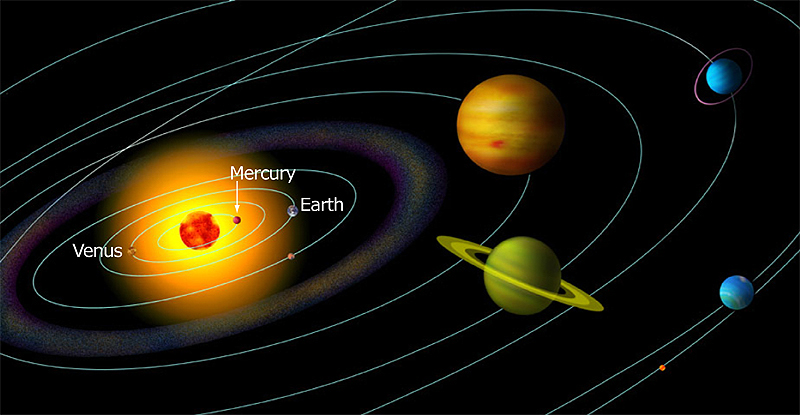
When
exterior planets bunch up and the Earth althernatey joins and leaves
them, things get intense...
But things can still get quite
stressful, especially for any
given single planet when the rest kind of gang up on it, which is what
is
happening to us right now. Every now and then the planets outside of
our orbit
(Mars, Jupiter, Saturn, Uranus, Neptune, Pluto, the heavies) all bunch
up on
one side of the solar system, leaving us left out on the other side of
the Sun
for half our year, then pulling us racing back into the crowded side,
after
which we struggles to pull away from the bunch and proceed on alone
until it
repeats the process or the planets gradually redistribute.
This causes rhythmic gravitational
stress on the planet as a
whole, and if that long yearly rhythm filters down variously through
our
environment as upper-partial, overtone-series changes in timing and
intensity,
we all feel it. Without any physical theory, astrologers have noted the
change
across the ages. Such as:
When we’re outside
the bunch, bowl or bundle charts predominate which are
traditionally
associated with more isolated personalities that can go it alone better
(perhaps because natally they spend half their time with no direct
transit
conjunctions in the empty half of their charts). And we see lots less
of the exterior planets in the night sky, as they're daytime objects
blocked by the Sun.
This is also a period with fewer retrograde
planets, also suggesting people and situations that act
alone or with less reference to others. We think we're alone (we
literally are), and we act that way.
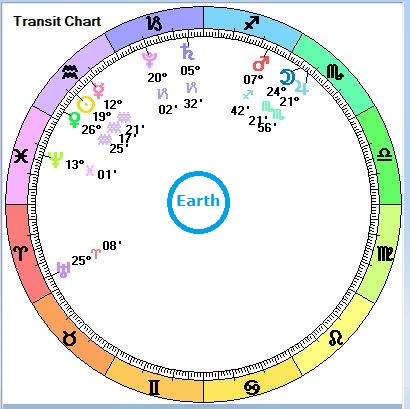
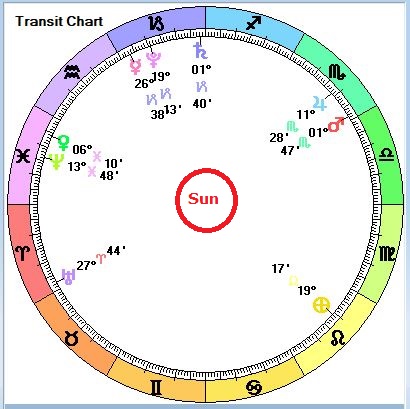
Last
winter was our first of a series of being stranded outside the bowl of
planets (geo l., helio r.)
When we’re inside
the
bunch, bucket charts (usually w/Sun or inner planets) or locomotive
charts,
abound, both associated with highly motivated individuals with more
specific
exterior focus. When Mars is the handle, especially when it’s at
the beginning
of the series following first a depression/recession Saturn bucket sky
followed by a recovery out-of-control Jupiter bucket, the danger of
conflict is highest. A good example is the transition of the late 1930s
and next year
(<-- see inclusive time-animated skychart links)
This is also a period with lots of retrogrades,
as we are rushing through the bunch, making some of
them appear to move backwards as we race by, and generally associated
with
personalities and associations that require sometimes-crippling pause
for
thought, engagement, and readjustment. Interestingly, that's when we
more regularly see those exterior planets in the night sky, feel their
presence.
What you don’t see so much of in
either is splash charts or
see-saws, except from brief passages of the Moon, which would indicate
more
balance, a more inclusive view of the world.
For natal charts, that means two
totally opposite sets of
kids being born each year, and the same for events. Half the year
things
proceed as if we are an island able to ignore the implications
of things we do, followed by the second half filled with retrogrades,
course-changing,
and remorse, the result of being right in among everybody and having to
deal
with them all, after ignoring them, sometimes too late.
So, essentially, we are running from
pillar to post,
constantly forced to reverse course, snap back into another mode before
we’re
used to where we are, just like a roller coaster, making it hard to
keep up
with events and causing widespread disorientation in the middle of
too-rapid
developments that get ahead of us.
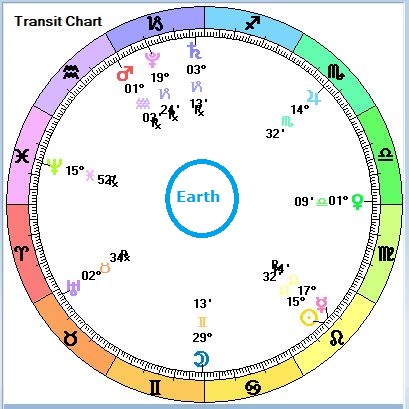
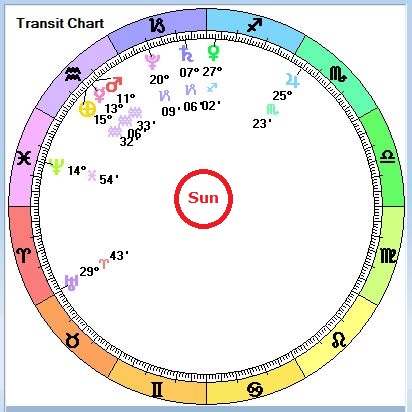
This
summer will be the first we're inside the bowl of exterior
planets, retros abound as we race past...
Sound like what’s happening now?
How often does it happen?
What does it mean for the future?
Right now we are alternating between
being outside in the
winter months (there were no retrogrades from New Year until the first
week of
March), and come summer we will be plunged into the middle with four or
five retrograde
planets all season. And, this will continue for the next couple of
years, until
well after the vortex Jupiter-Saturn
conjunction of 2020.
These clusters happen regularly, most
often when the outer
planets cluster and then are joined by Jupiter and Saturn in one of
their
20-year-cycle conjunctions in or near the cluster. Example
years (and the immediate periods surrounding) recently
would be 1914, 1940, 1954, 1960, 1982, 1994. Not that infrequent
recently, but
sometimes, when the outer planets are widely distributed, it
doesn’t happen for
long stretches, like nearly three-quarters of the eighteenth century.
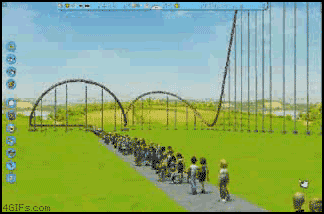
Although all were stressful times and
marked periods of
serious social change, not all were disastrous. It depends on how
well-knit the
social structure is and the potential for testing it beyond its
durability, as
well as the lead-up period. The most dangerous appears to be a
Saturn-dominated
period, followed by a runaway Jupiter period, featuring buckets with
both,
followed by their conjunction as in 1940, and the one about to
manifest. If
regular habits and beliefs are still strong or newly-built (as in the
several
post-War examples), then sometimes-perilous change happens but the
dykes hold.
When new media or rapid technology change is confusing and eroding the
and perception
of reality (as sound films, radio, the automobile, the airplane did in
the
1930s and the Internet has now), chaos has a much greater chance of
taking over.
Ultimately, if the house on the ground is strong, it will weather any
stresses
from sky weather. If it’s in disrepair or under too much
conflicting repair/rebuilding
to batten down, then it’s a different story.
Clearly, this is a big one,
for other reasons we have
pointed out earlier. Strap yourself in for the roller coaster ride...



